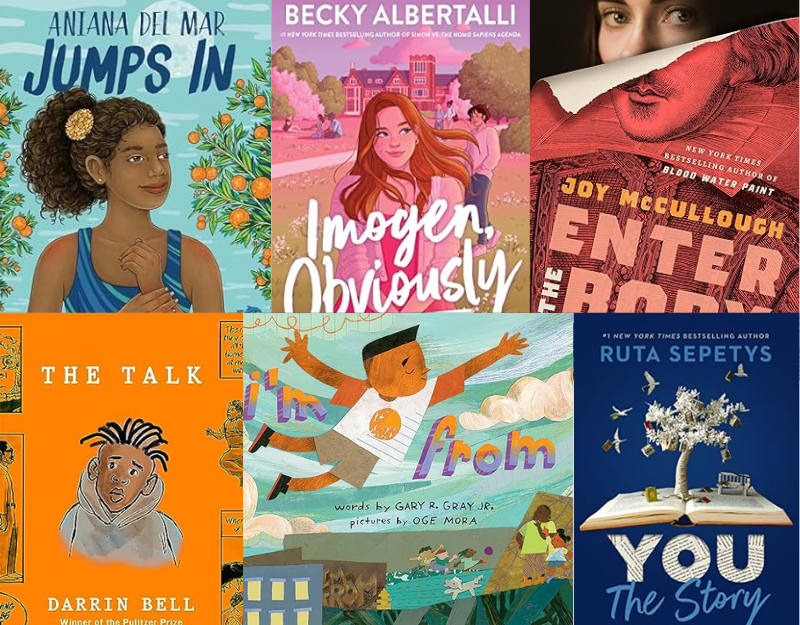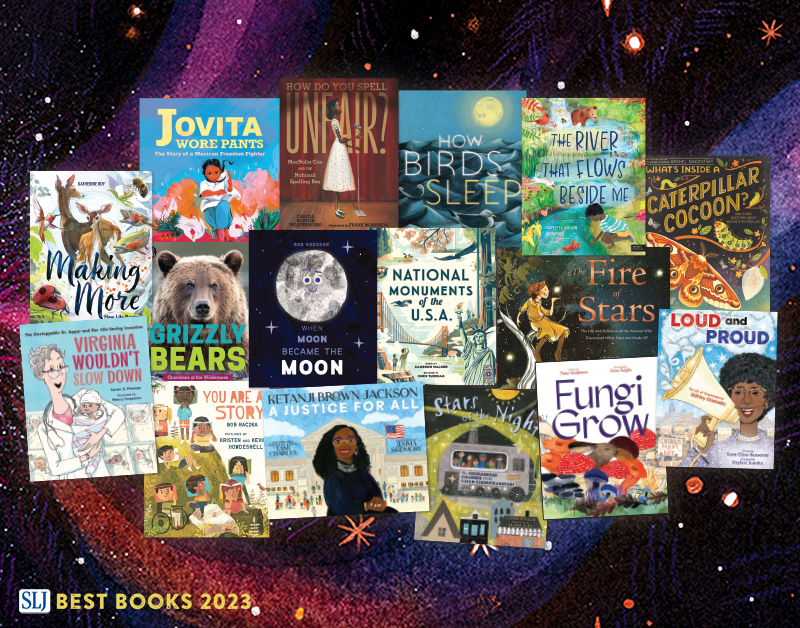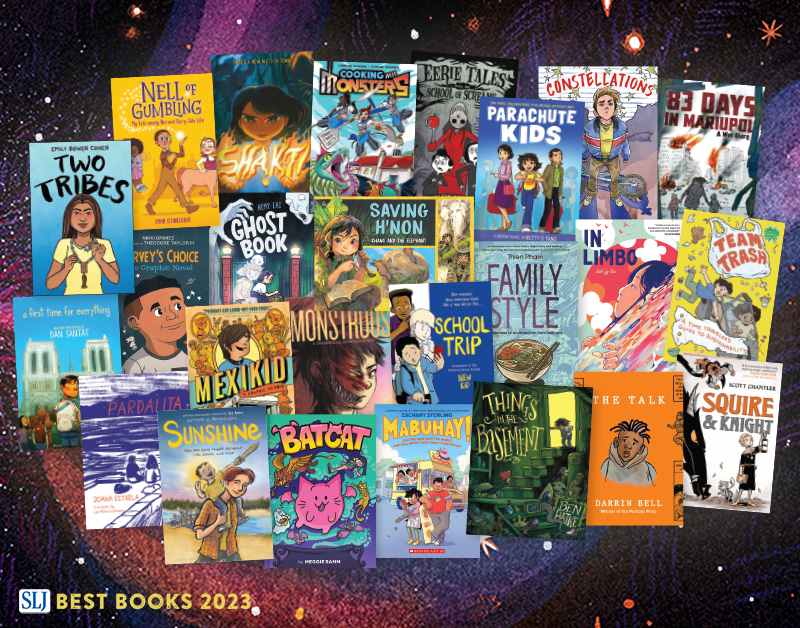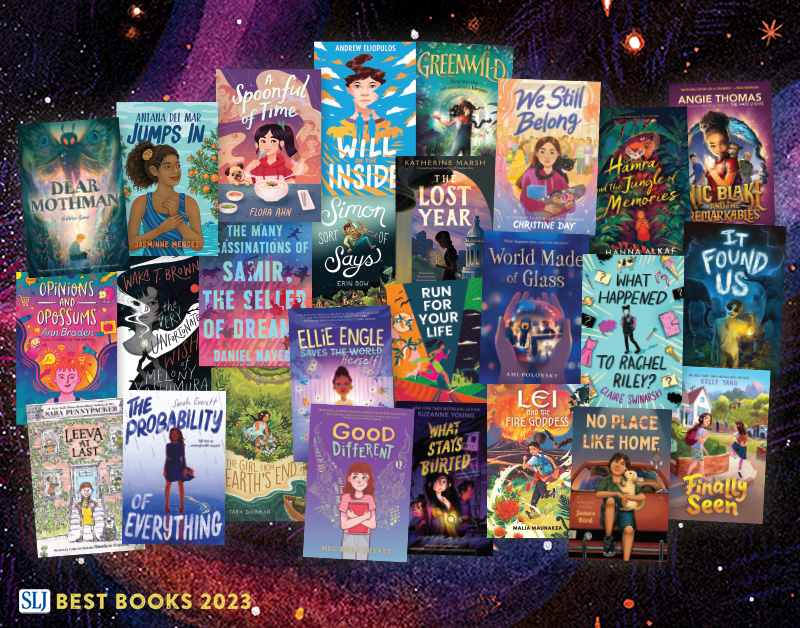Review of the Day: Orphan Island by Laurel Snyder
 Orphan Island
Orphan Island
Laurel Snyder
Walden Pond Press (an imprint of Harper Collins)
$16.99
ISBN: 978-0-06-244343-4
Ages 9-12
On shelves now
*spoiler alert on the whole darn review, basically*
I spend more time than I’d like thinking about what makes a person and how that person is an entirely new creation at different stages of life. Are you the same person that you were as a kid? If you’ve changed then does that make you someone new? Because my job consists of reading books for children, I like to pretend that I’ve a more finely honed and developed sense of what kids like than people that don’t have my job, but isn’t that a flawed concept right there? If I’m not the same person I was as a child, why should I have any reason to think that I’ve a better read on their preferences than anyone else? I don’t always have these thoughts. They only really surface when I encounter children’s books that squiggle into the deepest crevices of that organ between my ears. A book like Orphan Island by Laurel Snyder is almost perfectly designed to throw my assumptions (my sweet, precious assumptions) into a tizzy as I try to process the material and then, most difficult of all, turn my thoughts into a coherent review. Orphan Island is a metaphor, an allegory, a work of magical realism, a fantasy, a post-apocalyptic work of quiet science fiction. It’s for kids. It’s for adults who think they think like kids. It’s for adults that don’t think they think like kids at all. What’s the true story here? What is this book and who is its audience? Orphan Island is a book that leaves you with more questions than answers. And clearly this review is fated to follow suit.
Helpless. That’s a good word for it. When Jinny hears the bell, and sees her friend Deen, and sees the approaching green boat, that’s how she feels. Helpless. On the boat coming to her small island is a girl named Ess, not much older than four or five. It’s Jinny’s turn to take care of a child and Deen’s to leave the island for good. After all, it’s like the old rhyme says: “Nine on an island, orphans all, / Any more, the sky might fall.” But Jinny doesn’t hold with the old rhyme, she just wants Deen to stay. He doesn’t. He goes. (helpless). Jinny raises Ess in his wake, teaching her swim and eat and read, though not very well (helpless). And when a year has passed and that boat comes bearing a new child with eyes as blue as Jinny’s, she’s faced with the inevitable, right? The boat comes. A child leaves. It’s her turn. So what happens when someone doesn’t want to feel helpless anymore? What happens when she dares the sky to fall? What happens on Orphan Island when someone doesn’t play by the rules? Jinny, and everyone else along with her, is about to find out.
ADVERTISEMENT
ADVERTISEMENT
I like this book. I feel like this is something I need to establish early on. What I need to understand then is the degree to which I like Orphan Island because I am an adult vs. what a kid would like about it. Put another way, is this the paradise of the 21st century overscheduled technology-driven child of helicopter parents or the nightmare? Since I was raised in an era when parents didn’t always know what their kids were doing, am I more naturally inclined to see this island through a rose-colored lens. Is that unattainable freedom precisely what would make this book appealing to a kid today? It’s probably just as enticing (maybe more so). These questions get more pointed when we zero in on specific story elements. Let us, for example, look at Jinny’s inability to let go of Ess and acknowledge that she’s growing up and doesn’t need her any more. That’s a parenting issue. It’s something that adults instantly understand and, if not empathize with, at least acknowledge. What is the childhood equivalent? Or does it even matter? If the child reader is identifying with the loss of everything that’s familiar (a feeling in Jinny that almost rivals her fierce protectiveness of Ess) does that mean that Jinny’s parental instincts aren’t seen as important?
Oh, the book clubs are gonna love this one. I mean, there’s a lot to chew on here. I can already imagine the theories. Maybe the kids are all dead and this is a kind of happy purgatory for them. Maybe it’s like Hokey Pokey (more on that later) and the island is just a metaphor for childhood. Maybe it’s a post-apocalyptic world where this island is the only safe place for special children. Maybe they’re the last children in the world. Maybe all the children in the world are given their own islands. Imagine the book clubs sinking their teeth into all the questions here. The person leading the discussion really only has to ask one single, solitary question to get the ball rolling: What is going on here? Let the games begin.
Not that that’s going to comfort kids like the 9-year-old inside of me. I’ll tell you truly that the first book I ever disliked thoroughly was Stuart Little. It was in third grade and Mrs. Castle (rumored to be the “mean teacher” though I never saw it) was reading a chapter of E.B. White’s classic to us every day. And, as all good things come to an end, finally she reached the end of the book where Stuart goes off in his little canoe to find his friend the bird. The end. Ladies and gentlemen, I cannot express to you the rage I felt at this ending. Pure, unmitigated rage. How dare Mr. White leave us hanging like that. How dare he leave his loose ends dangling without the sense to pick them up! Was there a sequel? There was not. I wanted answers. They were not forthcoming. Never before had I ever encountered a children’s book that left so much to the reader. Snyder’s book treads this same dire path. She knew this as an author, of course. She knew that she’d received mail from her readers for years, probably decades to come. If this book becomes a modern day classic then she will never escape its ending. This isn’t to say it isn’t the right ending for the book, or even that it isn’t the most necessary ending you could give. It just means that generations of children are going to know precisely what it means to anticipate answers they were never meant to receive.
It’s not like I haven’t read halcyon accounts of childhood through a magical realism lens before. The most obvious modern correlation to this book is Hokey Pokey by Jerry Spinelli. Spinelli’s fantasyland is a little more firmly steeped in 1950s nostalgia. Still, like Orphan Island, it talked about the moment when a kid knows a change is coming (a fading tattoo, a boat on the horizon) and that they must move on. Which, let’s be honest, is a concept that dates back to one book and one book alone. I am referring of course to Peter Pan. Snyder could not have written Orphan Island without the shadow of Pan flitting about. An island of children that live by their own rules? We’re not talking about The Lord of the Flies for crying out loud. But these days I often feel like children’s books are indictments of Pan’s creed. Pan wouldn’t have just beached the boat, he would have ravaged it until it was little more than thin green splinters. This island is no Neverland, for all that adults might see it that way.
ADVERTISEMENT
ADVERTISEMENT
What’s interesting, and I don’t know how to put this, is that at the heart of this book, Jinny is questioning the universe. She’s putting an unfeeling god to the test. She is a Doubting Thomas. She is a character akin to religious forbears, howling out to the universe, asking why. We want our children to ask why. Or, at least, we tell ourselves we want them to. Truth be told, when the child starts peppering the harried adult over and over with “why” questions, suddenly that instinct doesn’t seem as charming as it did when they were younger. Particularly when the answers are no longer so simple. Jinny asks why, but as there is no means of answering her (or, one might argue, no inclination) she takes that silence as her answer. But for all that Jinny questions, she is content, at least for a while, to not leave to seek out the answers.
I mentioned Jinny’s similarities doubters of Old and New Testament lore but consider the island itself. Its Eden-like similarities are hard to ignore. The kids pass down old texts and rules for generations without question. They are tended by an unseen hand, kept safe from weather and animals, and as long as they obey the rules they are fine. What animals live on the island? Snakes. Snakes that, when this Eden is questioned in pursuit of knowledge, dole out punishments blindly. Laurel Snyder as an author has written many children’s books with a distinct Jewish bent. Her early middle grade novel Any Which Wall was one of the first I’d ever read with Jewish kids in a fantasy that had nothing to do with their religion. She’s followed that book up over the years with titles like the truly amazing Passover story The Longest Night or the more urbane Baxter, the Pig Who Wanted to Be Kosher. And let me state that there is nothing at all in this text to indicate that any of these characters have a religious denomination. This is just a book that poses big questions in a unique setting and offers no definitive answers for the reader. Snyder may not have written with spirituality in mind, but I think she’d agree that there is a worldview at work here that could be interestingly interpreted by a multitude of different religions.
What’s so interesting to me is how well Snyder imbues her text with the feeling that something is desperately wrong. She sets up the world very neatly. We meet it almost at the same time as Ess. We are charmed alongside her. And when that moment comes for Jinny to set foot in the green green boat, we feel a shift in the cosmos as that simple act is denied. This is compounded (fairly?unfairly?) when Jinny takes Ben’s charge, Loo. The question can then be whether or not Jinny’s actions in not leaving are as bad as taking Loo. What does Jinny owe the others in the group? This isn’t a 9-12 year old edition of Ayn Rand, so you’re pretty sure that the message isn’t that individual needs are more important than those of the collective, but at the same time I like that Snyder leaves what happens later to the island open to interpretation. Has Jinny really “broken” everything or is this a case of coincidences and a bit of the old tree of knowledge, snakebites and all? If Snyder were truly condemning Jinny, why are her questions so legitimate? She may get into that boat at the end out of necessity, but she gives Ben the letter than will open his own eyes a bit more. A little knowledge is a dangerous thing.
I’ve written a lot of reviews of children’s books in the last 14 years. Some were good. Some were awful. But none of them contained even half as many questions as the ones I’ve written here today. I suppose it’s appropriate for a book with an open-ended ending to elicit queries with no answers, but it feels odd to me. So often (too often?) children’s books do all the heavy lifting FOR their child readers. Almost as if they don’t trust kids to make their own answers. There are always exceptions to this. The aforementioned Stuart Little. The ending of The Giver by Lois Lowry (apocryphal sequels notwithstanding). We adults are so fond of our certainty these days. We go on the internet proclaiming what is and isn’t true in big cap locks, with clever GIFs, and 140 characters. But when you’re uncertain about something you have the capacity to learn. Kids have the capacity to learn, and Orphan Island gives them that. Laurel Snyder has handed them the gift of uncertainty and in this day and age it’s a treasure precious. And rare.
On shelves now.
Source: Galley sent from publisher for review.
Like This? Then Try:
- Hokey Pokey by Jerry Spinelli
- Criss Cross by Lynne Rae Perkins
- Dandelion Wine by Ray Bradbury
Professional Reviews:
Interviews:
- Ms. Snyder discusses the book over at Writers’ Rumpus, mentioning the possibility of a prequel to this story.
Misc:
- Feel free to read this little blog post from Ms. Snyder dating back to 2014 when she’d just finished the book.
Filed under: Best Books, Best Books of 2017, Reviews, Reviews 2017
About Betsy Bird
Betsy Bird is currently the Collection Development Manager of the Evanston Public Library system and a former Materials Specialist for New York Public Library. She has served on Newbery, written for Horn Book, and has done other lovely little things that she'd love to tell you about but that she's sure you'd find more interesting to hear of in person. Her opinions are her own and do not reflect those of EPL, SLJ, or any of the other acronyms you might be able to name. Follow her on Twitter: @fuseeight.
ADVERTISEMENT
ADVERTISEMENT
SLJ Blog Network
The Moral Dilemma of THE MONSTER AT THE END OF THIS BOOK
Winnie-The-Pooh | Review
Parsing Religion in Public Schools
ADVERTISEMENT








Thank you for this. When I first read a review of Orphan Island I wondered if I (a 70 year old) could handle this book! I’ll give it a try.
I’ll add that I waited a bit to read The Hate U Give for some pretty chicken s##t reasons, but when I finished it the other day, I was so glad I read it. Powerful and intense and worth the effort and the tears. So I think Orphan Island will be worth the uncertainty too.
I think I’ll wait until summer madness is over before I read this one. Sigh. That moment of realization – when I was 12, looking out over the hillside beside our house – when I knew life could not stay the same, was the first heart break I truly experienced. I loved kid-dom. I still do.
I remember that exact moment, too. Funny how it is so crystal clear for so many of us. The tug o’war of growing up against staying a kid.
Orphan Island is our community mother/daughter book club selection. We have our discussion next week and I’m really curious what the reaction will be from the moms and girls. We are loving it in our own household and have many, many questions. I’m sure we’ll focus on the various island personalities and how they work together (or don’t), but the meaning and ending are likely to consume most of the discussion.
I almost want you to report back here what you guys discuss. Heck, if you wanted to write a guest blog post about it for this site, I’d be more than willing. I think this is something a lot of people have questions about.
How could I say no to that idea?!? Sure, I’d love to do a guest blog summarizing the community mother/daughter book club reaction. Our community mother/daughter book club facilitator is a 5th grade teacher in our district…I think she’d also have a lot of great insights as to how the group reacts to the book and the differences between the mothers’ reactions and the girls’ reactions. We can send something your way!
Awesome! Okay, you go do that bookgroup. Then just email me when you’re ready and I’ll put something up right-quick.
Oh, this will be fun . . .